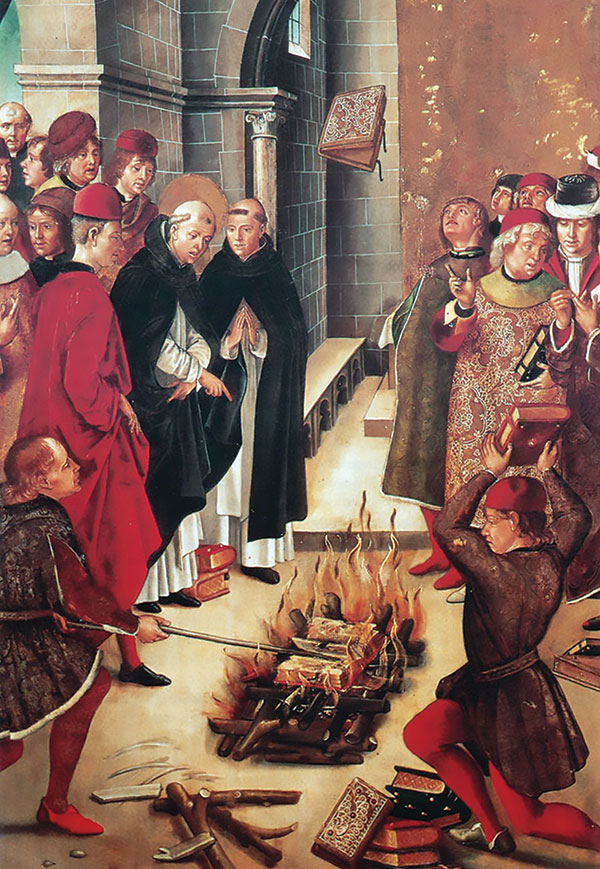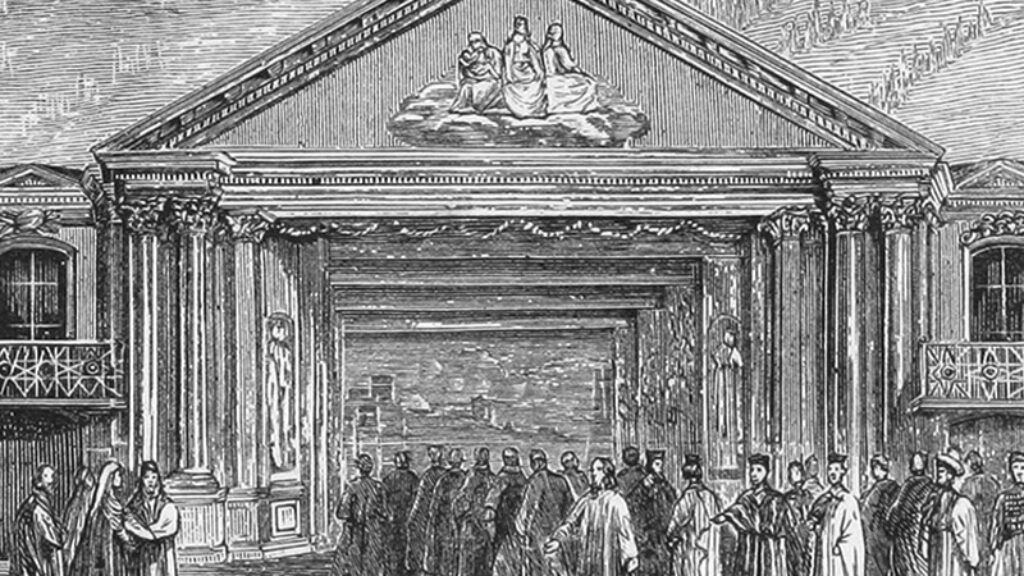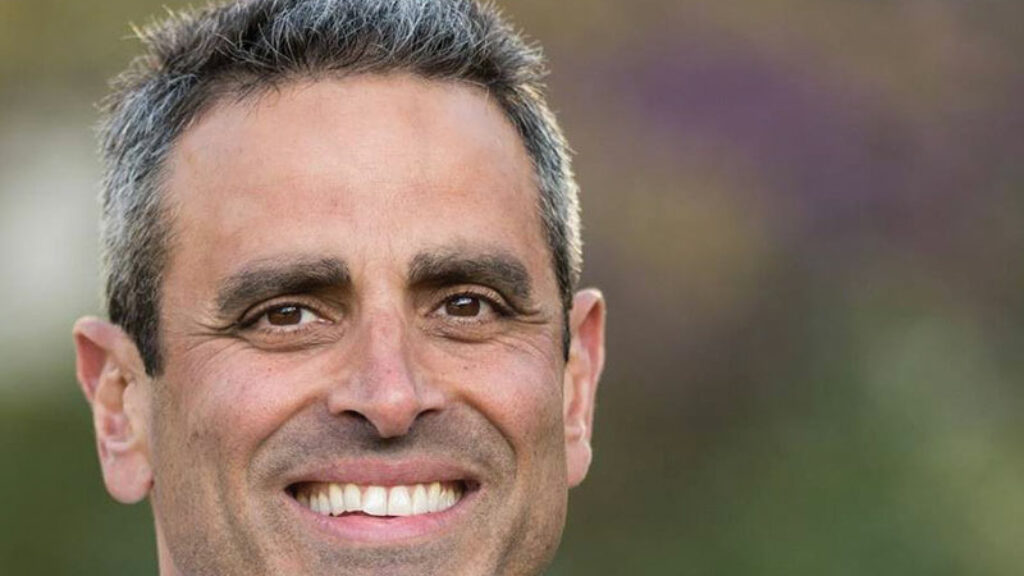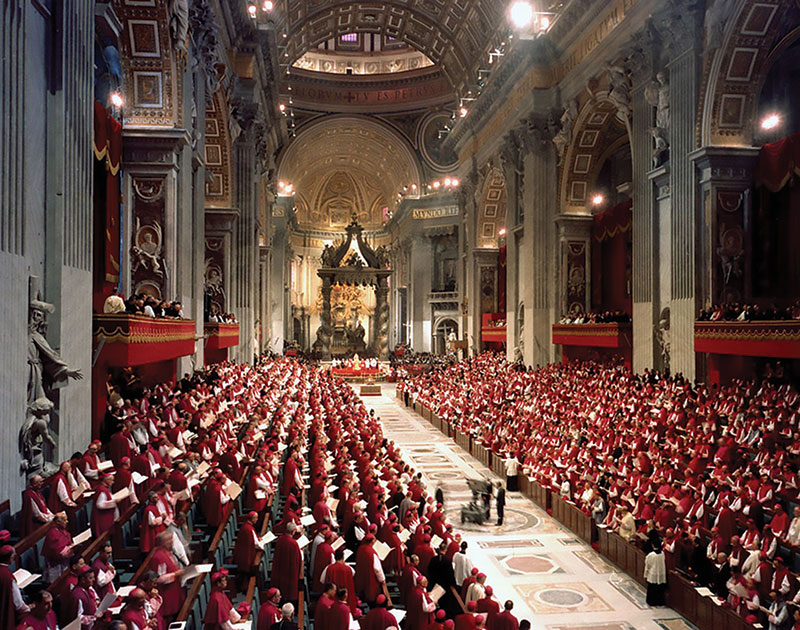The Integralists and Us
Four decades ago, some law students hosted a conference at Yale that spawned the Federalist Society, membership in which is now an informal requirement for success as a conservative lawyer. FedSoc (as it’s known) might be the most important professional association in America. In return for tolerating Donald Trump, its vice president was invited to vet nominees to numerous federal judgeships and three seats on the Supreme Court.
Whatever you think about recent legal victories at the Supreme Court for the American right, they are a reminder that small, savvy groups can reorient a democratic country through its least democratic institutions. But if a new group arises with the aim of duplicating FedSoc’s success for other ends, I bet it’ll be born not at Yale but at Harvard, on the law faculty of which sits Adrian Vermeule, the most prominent member of America’s sharpest set of insurgent intellectuals—the Catholic integralists.
Just a few years ago, Vermeule was a legal scholar known outside the academy, if at all, for some articles about institutional design and for defenses (sometimes authored with Cass R. Sunstein) of the federal administrative state. He became better known for an article in the Atlantic in March 2020 that sketched an “illiberal legalism” that takes as “its starting point substantive moral principles that conduce to the common good, principles that officials . . . should read into the majestic generalities and ambiguities of the written Constitution.” Vermeule filled out the details of this argument in his recent book Common Good Constitutionalism, which argues that “legislators and executive agents as well as judges ought to interpret constitutional principles in light of the common good.”
Legislators are one thing, but recent legal conservatives have mostly thought that judges and administrative state officials should confine themselves to interpreting and enforcing written laws whatever ends those laws advance. According to originalism—the main philosophy on the legal right—laws retain the “original public meaning” they had when enacted. Vermeule correctly notes that originalism often motivates disruptive legal rulings—for one thing, the Founders’ America is very different from today’s—and so in one respect is not conservative. But even so, a certain modesty structures the originalist project. What words meant when the laws containing them passed is a question for historians, not moral philosophers. Originalist judges are supposed to be bound by empirical facts to value-neutral enforcement of statutes and the Constitution.

Vermeule argues that this value-neutrality is an “illusion.” Consider the Eighth Amendment, which prohibits “cruel and unusual punishments.” Does “cruel” rule out just the punishments generally believed to be cruel in 1791? Or does the term refer to a general attribute of punishments? Following the great liberal jurist Ronald Dworkin, Vermeule proposes that originalism gives a judge no tools for deciding. Even if we knew that the term “cruel” had a unified and agreed-upon meaning in 1791, we would still need a reason to take that as decisive now. We would need a theory about the purpose of having laws about punishments and about the authority those who make such laws should have over those laws’ interpreters. This, in turn, would require a more general theory about the point of having political authorities in the first place—and of the common good towards which they should strive.
Vermeule points out that American judges used to appeal to the common good frequently and that administrative lawyers do still under various guises, as when they talk of the public interest. Vermeule leaves it to others to argue for which forms and aims of social life the common good includes. His immediate goal is to rouse originalists, many of them Catholics, from their dreams of value neutrality. They’ll awake hungry for a theory of the common good to guide judicial thinking. Vermeule hopes—to quote from his article “Integration from Within”—to win converts to the example of “St. Paul himself, who by the end of Acts of the Apostles preached the advent of a new order from within the very urban heart of the imperium.” Elsewhere, Vermeule has been more explicit, endorsing the “strategic” vision of the Cistercian monk Edmund Waldstein: Catholics should “work for the common good” in liberal institutions with the hope of the “restoration of an integrally Catholic state.”
Waldstein offers a concise definition of Catholic integralism in the journal The Josias, which he edits and to which Vermeule has contributed. Integralism is “a tradition of thought that, rejecting the liberal separation of politics from concern with the end of human life, holds that political rule must order man to his final goal.” It is also a thesis about the identity of those who govern: “Since, however, man has both a temporal and an eternal end, integralism holds that there are two powers that rule him: a temporal power and a spiritual power.” Finally, integralism is a thesis about proper hierarchy among those who govern: “And since man’s temporal end is subordinated to his eternal end, the temporal power must be subordinated to the spiritual power.”
What the integralists call the social reign of Christ will be achieved by integrating the temporal power (the state) with the spiritual power (the Catholic Church). The military, the economy, the arts, and religious life will be directed toward human flourishing as defined by one severe reading of Catholic tradition. Which doesn’t mean bishops would command armies or set tax rates in Waldstein’s polity—civil authorities in an integralist regime would retain broad spheres of competence within which to forward the ends prescribed by the Catholic Church, but the Church would define those ends.
Integralism doesn’t quite sound like a winning platform for a presidential campaign, but the integralists don’t plan to run one. Writing in American Affairs in 2018, Vermeule offers a program of “integration from within.” Federal judges and bureaucrats will “co-opt and transform the decaying regime from within its own core.”
For now, integralism is far outside the mainstream of Catholic social teaching, though it is popular with bookish, zealous young Catholics who diagnose their country’s condition as terminal. Before an integralist regime becomes the political goal of a generation of well-credentialed, organized, and devout Christians, we might inquire how it would treat some group not obviously better off for its advent. Say, the Jews.
Vermeule and other integralists are peculiarly interested in thirteenth-century France under the reign of Louis IX, especially as described in Andrew Willard Jones’s recent revisionist history Before Church and State. In a 2018 essay, Vermeule lamented that what contemporary popes dubbed “a most Christian kingdom” is unlikely to be restored, “whatever its attractions.” What were they? According to Jones, Louis IX’s France did not distinguish secular from religious or the state from society. Rather, “the material and the spiritual were totally dependent on each other and penetrated one another at every level.” No solid line divided “religious” inquisitors from enqueters tasked with settling civil disputes. They all diligently pursued the “business of the peace and of the faith,” the perfect condition of a political and legal order integrated for the sake of Christ. “Within this logic,” Jones writes, “the legitimate use of force becomes identical to holy war and crime or rebellion becomes identical to heresy.”
The main event of Louis IX’s monarchy was the crusade of 1248–1254, of which Jones says only that it was “not a success.” Let me add a few points. Louis’s crusade did not just lead to anti-Jewish persecution but depended on it. William Chester Jordan, a distinguished scholar of the period, writes that loans from Jews to Christians were canceled and Jewish property confiscated to fund the expedition. Mercenary anti-Jewishness united French noblemen behind Louis, who, Jordan writes:
channel[ed] the enthusiasm against the Jews (the enemy of Christianity at home) into enthusiasm for the crusade (against the enemy abroad). The financial gains that the king’s barons could expect from “taking” the profits of Jewish usury . . . were the material link between the two.
The colossal failure of the crusade—king and army had to be ransomed from their Muslim captors—impelled Louis to ascetic piety and charity. In further acts of teshuvah, Louis tried bribing Jews into the church, expelled Jews who loaned money at interest, and confiscated new—though not old—synagogues as punishment for Jewish usury.
Alas, synagogues of all ages were impoverished in Louis’s France, for one of the great constants of the king’s life was a hatred of rabbinic texts. In 1240, Louis IX obeyed Pope Gregory IX’s instruction to rid France of Jewish writings that imperiled the kingdom’s fidelity to Christ. The Talmud was publicly burned with other Jewish books in Paris, effectively terminating a great era of Parisian rabbinic scholarship.
But this is all a very long time ago, and even Vermeule concedes that the Capetians aren’t coming to America. To see what an integralist polity might look like today, we need to turn to the helpfully titled Integralism: A Manual of Political Philosophy by Thomas Crean and Alan Fimister. Crean is a Dominican monk, and Fimister is a Catholic academic who has written for The Josias. Integralism is an old-fashioned political treatise, moving from basic propositions about human nature to a detailed picture of a regime. Most of Crean and Fimister’s ideas could adapt to American-style separation of powers and even elections, for they are concerned mainly with the ends, not the institutional mechanisms, of government. Theirs is the best picture to date of what the integralists want to achieve. Vermeule reports in The Josias that a Jewish colleague once asked, “In a fully Catholic polity, the sort you would like to bring about, what would happen to me, a Jew”? “Nothing bad,” Vermeule replied. OK, let’s see.
Every political theory has to say what kinds of lives a state’s power should be used to help people live. Many liberals think the state should protect against extreme want and certain kinds of coercion—physical for sure, and maybe also economic—so that people can live more or less as they like. Certain others (many contemporary liberals would consider them nonliberals) think that besides securing citizens against want, the state should help citizens flourish in certain respects: by promoting the traditional family and religious life and by discouraging even freely chosen forms of vice—adultery, numerous forms of self-harm, and public obscenity.
Crean and Fimister are far more ambitious. Because the central feature “of a good earthly life” is its “being rightly directed to the life beyond,” the science of politics “must understand how man is directed towards beatitude”—that is, eternal blessedness. In consequence, a Christian ruler “must not pursue the temporal good of his realm in any way that could obstruct the citizens’ pursuit of their final end.” It’s important to Crean and Fimister that getting in to heaven involves many parts of human life that the state rightly concerns itself with. For instance, almost every state guarantees some level of education—to make good citizens, productive workers, and, more generally, because you need to know things to live well. Crean and Fimister write that “without knowledge of his ultimate end, man cannot correctly pursue even those elements of his end which he is able to grasp by natural reason.” Schools that don’t prepare students for admission to heaven are thereby failing in their central mission. And indeed, Crean and Fimister write, a ruler “may not lawfully establish secular schools.”
Crean and Fimister’s government does not have unlimited power. They write, for instance, that civil authorities may not prevent a competent man and woman from marrying and having children, since marriage is “an ordinance of nature” and not the state. But a Christian ruler will be plenty busy “keep[ing] his realm free . . . from all heresies and other opinions solemnly condemned by the Church,” punishing “crimes of heresy and schism in a baptized person” by depriving the offender of citizenship, and dispensing “particular law” to non-Christian groups “in order to prevent them from doing harm to his realm.”
As the purpose of the polity is Catholic, so, too, must be its governors. Here are Crean and Fimister on who can hold office:
In a formally Catholic society, not only idolaters and atheists must be generally excluded from the legislature, and from the higher executive and judicial offices, but also all the unbaptised, as well as all adherents of heretical and schismatic bodies.
So, Jews out of Congress, the executive, and the courts.
Who holds power depends on who is a citizen, and again, I’ll let Crean and Fimister speak for themselves:
Since a citizen, simply speaking, is a subject endowed with certain rights and duties within a society because of his presumed willing of that society’s common good, only someone who professes the gospel, as taught by the Church, can be a citizen simply speaking within Christendom.
So, Jews won’t be citizens, though in an act of “toleration,” the state might let them send a delegation to the legislature.
It’s not only as individual voters but also as members of organizations that Jews are to be disenfranchised. Crean and Fimister allow that “guilds, unions, associations of employers, and universities may fittingly elect representatives to the legislature, or have some direct right to vote on measures that concern them.” I don’t see how (except as an act of toleration) Jewish lawyers and mechanics could vote for or serve as representatives of their guilds, since as noncitizens, Jews are generally disqualified from wielding public power.
To be sure, Jews have often survived in this sort of state, disempowered but allowed to go to shul and to learn Torah. Crean and Fimister emphasize that “the use of violence to secure adherence to the heavenly city is a forbidden blasphemy,” which is nice to hear. But Jewish children may be a different matter. I quote once more from Crean and Fimister:
When a child is born again in baptism to a supernatural life, the Church as mother of this new child of God has the right to educate the child for beatitude. Since this end is immeasurably more important than any other, this right of the Church cannot cede to any other right.
That is, a child who has been validly baptized could become a ward of the church—“In extreme circumstances, the authorities of the Church may take a baptised child even from its parental home if its religious education cannot otherwise be secured.”
Extreme circumstances are not hard to imagine. Baptism takes only water and seventeen words: “I baptize you in the name of the Father, and the Son, and the Holy Spirit. Amen.” According to the church, coerced baptisms are nearly always wrong to perform but are not therefore invalid. If the Jewish parents of a child who’d been secretly baptized stubbornly refused to raise their child Catholic, the church would do it for them.
All this might be academic if it weren’t also historical and, in a way, contemporary. In June 1858, in Bologna, Italy, a Jewish child named Edgardo Mortara, who’d been secretly baptized by his Catholic nanny, was taken from his parents’ home by papal police. Papal state law required baptized children to be reared as Catholics, so young Edgardo was raised educated under the supervision of Pope Pius IX and then ordained to the priesthood.
The Mortara affair returned to scrutiny yet again in 2018 when First Things published a review by Father Romanus Cessario of Mortara’s translated memoirs that defended the church’s actions. In the ensuing kerfuffle, First Things editor R. R. Reno described the Mortara episode as a “stain on the Catholic Church,” the abduction itself as “grievous,” and affirmed that Vatican II “implies that the Church should not have recourse to the coercive power of the state to enforce her theological principles.” Reno’s view was seconded by Philadelphia archbishop Charles Chaput in these pages and by many other distinguished writers in leading Christian magazines.
Vermeule dissented, writing that there was no “concrete, feasible alternative in the Mortara Case for executing the duty to provide a Catholic education.” Anyone agreeing with Crean and Fimister that the Church’s right to raise baptized children Catholic is “indefeasible” is committed to the same coercive view.
For now, the integralists do not endanger American pluralism. What they mightthreaten is ecumenical conservatism—the cohort (among which I count myself) of clerics, activists, writers, and the occasional pol trying to make American laws more virtuous and American culture more religious. It’s mostly Catholics who lead today’s ecumenical movement, and, given who signs up for conservative politics at top universities, that seems unlikely to change.
Integralism’s apparent purity attracts intelligent young Catholics who want to distinguish themselves from their more moderate teachers. And alas, America’s present discontents—Vermeule has written of the “slow-motion collapse” of the liberal regime—make otherwise unthinkably radical views not only thinkable but even respectable. Integralism is well-suited to the anxious moment. Americans have more freedom than ever but little sense of how to use it; public policy often seems driven by free-floating grievances. Integralism proposes a polity stably founded on the word of God instead of whatever incoherent cholent we’re stewing in right now.
Integralism is a theory for elites. It threatens not a violent revolt but a long march through conservative (and eventually government) institutions by intelligent people hostile to Jews in particular and to the pluralism of the republic generally. In five years, integralists will have an association of young lawyers. In twenty years, they’ll have judgeships and administrative state jobs from a Republican president. None of this will require public approval—just savvy operators in Washington and in prestigious universities. Ordinary Christian conservatives may well tolerate the integralists as dependable allies on social issues. But the integralists will have the advantages of ideological purity and simplicity in every fight with those same conservatives.
In an extended critique of integralism in the journal Liberties, Leon Wieseltier writes that “the roots of [Vermeule’s] quasi-theocratic ideal are rotten with Jew-hatred.” Wieseltier is right. It is simple antisemitism to favor a regime in which political equality for Jews depends on them renouncing Judaism. Jews and Catholics together need to slam the door hard on Vermeule, Crean, Fimister, and anyone who’s alright with kidnapping forcibly baptized Jewish children and disenfranchising their parents—no matter how much Vermeule assures his Jewish colleagues they have nothing to worry about.
The good news is that integralism fails not only on American and Jewish terms (though the integralists don’t care) but on Catholic terms as well.
The Second Vatican Council grounded political pluralism in a theological commitment to religious liberty. Early-twentieth-century Catholic thought recovered “the ancient—indeed biblical—conviction that the act of faith must be freely made, or it is not a true act of faith,” in the words of the Catholic intellectual George Weigel. The council’s declaration Dignitatis Humanae ratifies this important teaching:
The right to religious freedom has its foundation not in the subjective disposition of the person, but in his very nature.
The destruction of European Jewry gave a moral urgency to Vatican II’s affirmation that God’s covenant with the Jews is perpetual and that the Jews bear no particular guilt for the death of Jesus. But prewar Catholic theologians were already connecting religious and particularly Jewish freedom with political equality. Among the greatest of them, the German Dietrich von Hildebrand, wrote as follows in 1941:
The anti-Semites . . . would place restrictions on individuals solely because they are Jews. . . . Any restriction of the rights of a citizen in consequence of his religious conviction is contradictory to the democratic idea.
Von Hildebrand’s sentiments—which need no revision to rebut the integralists—found political expression in Vatican II’s Nostra Aetate:
moved not by political reasons but by the Gospel’s spiritual love, [the Church] decries hatred, persecutions, displays of anti-Semitism, directed against Jews at any time and by anyone.
Dignitatis Humanae is more general, teaching that “government is to see to it that equality of citizens before the law, which is itself an element of the common good, is never violated, whether openly or covertly, for religious reasons.”
It’s true that Crean and Fimister write that Catholicism “forbids suasion toward baptism by temporal threats,” to which one might reply that depriving someone of citizenship sure sounds like a “temporal threat.” But never mind—here’s Vermeule on the powers of the administrative state:
It is a useless exercise to debate whether or not this shaping from above is best understood as coercive, or rather as an appeal to the “true” underlying preferences of the governed. Instead it is a matter of finding a strategic position from which to sear the liberal faith with hot irons, to defeat and capture the hearts and minds of liberal agents.
Burning stuff isn’t just metaphorical with the integralists. The Josias translated and published a “magisterial moral manual” by St. Alphonsus Liguori that praises an early modern Christian incineration of some books “together with their impious author.” When Vermeule writes in Common Good Constitutionalism that “the market for ideas should no more be seen as presumptively immune from authoritative guidance than is any market for goods,” is that the sort of searing he has in mind? Can any American of good conscience let this aspiring grand inquisitor near the First Amendment? Would any decent theist trust him to respect the full meaning of the first commandment?
Americans of many religious orthodoxies are trying, together, to heal a culture and a polity that leaves too many of its citizens hopeless and alone. It would be a terrible shame if the integralists were allowed to ruin the solidarity behind this movement—and perhaps the country as well.
Suggested Reading

Brotherhood
How did the world's most antisemitic play become a symbol of positive Christian-Jewish relations? Karma Ben Johanan's new book explores an evolving dynamic.
Straying from the Fold?
Are typical Jewish converts ensnared in the nets of Protestant missionaries “swindlers, thieves, drunkards, whores, schlemiels, schlemazels, nudniks, and no-goodniks”?
The Mortara Affair, Redux
Bologna, 1857: A six-year old is taken from his Jewish family to be raised a Catholic. Why are we still talking about this case? An archbishop responds.

Exit, Loyalty … Crowdsource?
It is a bit of a surprise to open a big-think policy book on the fate of the Jewish people and read a Jason Bourne scene with a prep-school payoff, but Tal Keinan is entitled to it.

Comments
You must log in to comment Log In